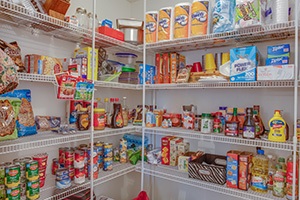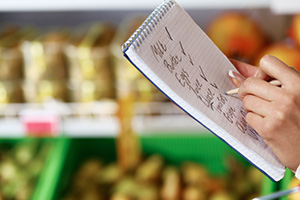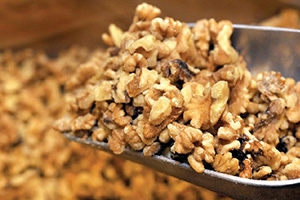Growing and preserving your own food is smart and economical – until it starts to spoil on you.
When you have a large stockpile of food that has started to go bad, you might find yourself frustrated by all the waste. Do you really need to throw out all that spoiled food – and is it really spoiled?
Knowing which foods go bad and when, exactly, they do, is essential if you are a homesteader or prepper of any kind. It’s smart to keep tabs on the shelf life of your foods – and to have a clear idea of what might happen if you decide to eat rancid food.
Here are some tips so that you can be prepared for whatever life throws your way.
Recognition
Rancidity is the oxidation of fat. Therefore, foods that contain more fat will go rancid more easily.
When oxygen that’s present in the air attacks molecules of fat, it creates a number of chemical reactions that lead to the formation of new (and admittedly stinky) molecules.
These reactions occur faster when light or heat are present, as well as in foods that contain polyunsaturated fats.
You’ll know that your food is rancid primarily by the smell.
It might smell a bit like wood varnish or wet cardboard. Rancid foods usually have the same appearance and texture as when they were first purchased, but the taste (and definitely the smell) will have changed.
What Foods Can Go Rancid?
While rancid is a term that’s often applied to a long list of foods, like meats, cheese, fruits, and other products, it technically can occur only when oils oxidize.
This means that rancidity can only occur in foods like whole flours, vegetable oils, brown rice, nuts, and seeds.
Related: How to Prevent Your Foods from Going Rancid
What Happens If You Eat Rancid Food?
There are several things that can happen if you eat rancid food.
Fortunately, you usually won’t get too sick and it won’t kill you. However, the molecules that form during the oxidation process can cause some digestive discomfort.
The good news is that eating a bit of rancid food here or there probably won’t make you sick. It’s the long term consequence you have to be worried about.
For starters, rancid foods will not be as nutritious as fresh ones. Oxidation destroys much of the vitamin content and good fats in the food. In fact, it’s suspected that regularly eating rancid foods can cause you to develop inflammatory or cardiovascular issues along with certain kinds of cancers.
Prevention
There are several ways you can prevent food from going rancid so that you don’t have to worry about the potential side effects.
 For starters, if you’re buying food to stock your pantry, do so in reasonable quantities. Although it makes sense to keep a stockpile, don’t purchase more than you and your family will realistically consume over time. Purchase the food from a store where there’s fast product turnover, too, so that you’re more likely to start with a fresher product.
For starters, if you’re buying food to stock your pantry, do so in reasonable quantities. Although it makes sense to keep a stockpile, don’t purchase more than you and your family will realistically consume over time. Purchase the food from a store where there’s fast product turnover, too, so that you’re more likely to start with a fresher product.
Check the packaging and best-by-dates, too. If you’re storing dry foods like cereals, flours, seeds, and nuts, repack them into sealable, airtight containers and avoid paper or plastic bags. Be sure to close these securely after each use. You may want to mark their expiry dates on the front, too.
Double-check your food before you eat it. For some foods, like oils, it will be easy to tell that they have gone rancid because you will notice the off-putting smell. For others, like nuts, the odor might not be as noticeable.
 This is why it’s so important to keep a list of which foods you purchased and when – as well as the shelf life of each product.
This is why it’s so important to keep a list of which foods you purchased and when – as well as the shelf life of each product.
Organize your stockpile so that older foods are out in front and you know to use them first.
It’s also a good idea to reconsider your storage habits. Many people store things like nuts in the pantry, but you will actually have better results stashing nuts in the freezer or refrigerator. They’ll last much longer here and you won’t have to worry about them going rancid.
Of course, with things like oils, you should store them in a cool, dark place to prolong their shelf lives. Try not to reuse and reheat the same fat or oil multiple times, as this can also lead to rancidity over time.
What To Do With Your Rancid Food
There are some rancid foods that can still safely be eaten. In fact, in the case of some rancid foods, we’re actually so accustomed to them smelling naturally rancid that we don’t know that it’s rancidity that’s leading to the unique aroma of the food.
 For example, we tend to be so used to the taste and smell of chopped nuts that are sold in grocery stores that you might not even notice that the aroma they give off is actually rancidity at its finest!
For example, we tend to be so used to the taste and smell of chopped nuts that are sold in grocery stores that you might not even notice that the aroma they give off is actually rancidity at its finest!
Most nuts are fresh for up to a year when refrigerated or four to five months when stored in the pantry.
You shouldn’t suffer from too many health effects if you choose to eat them but they won’t taste as fresh.
When it comes to rancid oil, you may want to skip cooking or baking with it. Rancid foods don’t usually develop mold, but they’ll lead to an awful-tasting finished product.
You can use the rancid oil for other purposes on the homestead, such as a lubricant and rust preventive, a lamp oil, or even a furniture polish and conditioner. Some people even use it in soap making!
Related: 8 Ways to Use Your Rancid Oil for Survival
Although some other foods can be eaten once they’ve started to go bad (anybody who’s ever cut a piece of mold off a brick of cheese and continued to eat the remainder will know this!) you should resist the temptation when it comes to rancid foods.
While nibbling a rancid almond here or there likely won’t cause you any ill effects, long term consumption can lead to some serious health problems.
Instead, keep your foods fresh by following the tips above – and you’ll be able to build a stronger, more reliable stockpile of food for the future.

No comments:
Post a Comment